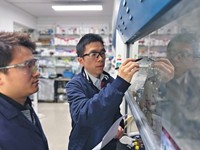Advertisement
Grab your lab coat. Let's get started
Welcome!
Welcome!
Create an account below to get 6 C&EN articles per month, receive newsletters and more - all free.
It seems this is your first time logging in online. Please enter the following information to continue.
As an ACS member you automatically get access to this site. All we need is few more details to create your reading experience.
Not you? Sign in with a different account.
Not you? Sign in with a different account.
ERROR 1
ERROR 1
ERROR 2
ERROR 2
ERROR 2
ERROR 2
ERROR 2
Password and Confirm password must match.
If you have an ACS member number, please enter it here so we can link this account to your membership. (optional)
ERROR 2
ACS values your privacy. By submitting your information, you are gaining access to C&EN and subscribing to our weekly newsletter. We use the information you provide to make your reading experience better, and we will never sell your data to third party members.
Research Funding
International collaboration yields less-novel research, study suggests
by Dalmeet Singh Chawla, special to C&EN
March 2, 2019
| A version of this story appeared in
Volume 97, Issue 9
Researchers who collaborate with colleagues abroad may produce work that is less novel than those who have collaborators in the same country, a new study suggests. Caroline S. Wagner of the Ohio State University, Travis A. Whetsell of Florida International University, and Satyam Mukherjee of the Indian Institute of Management analyzed references in 850,000 papers that were indexed in Web of Science in 2005 (Res. Policy 2019, DOI: 10.1016/j.respol.2019.01.002). They found that coauthors from different countries tended to cite papers only from their own discipline, suggesting the research was less novel. In contrast, coauthors from the same country tended to cite papers from their own and other disciplines, suggesting the research was more novel. “We’re really, really surprised” by the findings, Wagner says, noting that she thought international collaboration would boost novelty. One reason for the trend could be that scholars working at the international level are more conservative about their ideas, Wagner says. “The people that are working internationally are highly reputed and their interest is to maintain a reputation, not to make a reputation,” she says. However, the study is based on old data, notes Cassidy Sugimoto, an information scientist at Indiana University Bloomington. In light of that, “I would not use these results to advocate for a disinvestment in international collaboration,” she says.




Join the conversation
Contact the reporter
Submit a Letter to the Editor for publication
Engage with us on Twitter